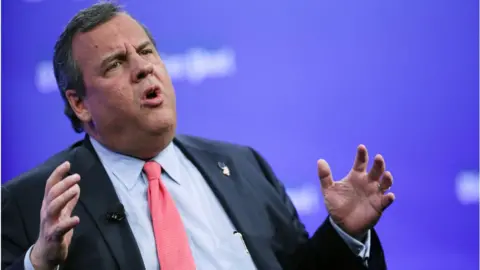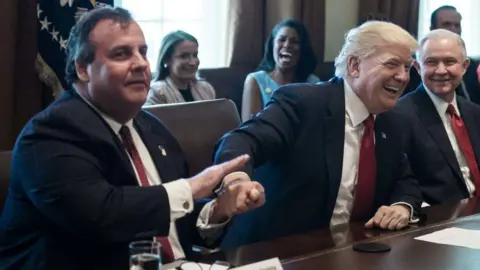Chris Christie's long-shot mission to torpedo Trump in 2024
As former New Jersey Governor Chris Christie enters the 2024 race for the White House, he has one mission: to torpedo Donald Trump's campaign. But his low popularity among Republicans may thwart his efforts to launch a head-on attack.
Seven years ago, his failed bid for the 2016 Republican presidential nomination featured debate-stage fireworks, disappointing voting results and a surprisingly early endorsement of Mr Trump.
Now, Mr Christie will need to take the current front-runner down a peg and then position himself as the one who can win.
In a speech kicking off his campaign, the former governor quickly went on the attack, calling Mr Trump a "lonely, self-consumed, self-serving mirror hog".
"Donald Trump made us smaller by dividing us even further and pitting one group against another, different groups pitted against different groups every day," he added.
Mr Christie formally filed the paperwork for his White House bid on 6 June, but the brash New Jerseyan starts this campaign from the back of the presidential pack.
Of the announced candidates so far, only Mr Trump and Florida Governor Ron DeSantis have any kind of widespread support in public opinion polls. Mr Christie, according to a Fox News national survey of Republicans released last week, had the backing of less than 1% of respondents. A Quinnipiac Poll put him at 2%. Mr Trump led the field by more than 30% in each.
To change this dynamic, Mr Christie will have to take advantage of limited opportunities. The most prominent is the series of upcoming Republican presidential debates that begin in late August.
"A lot of people are going to be gunning for Trump," says Republican strategist and former party communication director Doug Heye. "There's going to be a battle royal where everybody's trying to throw Andre the Giant out of the ring."
If that happens, he says, then the whole leadership race would be reset.

What happens next?
- Candidates for the Republican nomination will hit the campaign trail and begin a series of TV debates in the coming months
- Elections in each state - called primary elections - begin next February
- The person with the most support will be crowned at the Republican Convention in summer 2024
- The winner of the nomination looks likely to face Democrat Joe Biden in the general election in November 2024

 Getty Images
Getty ImagesBack in 2016, Mr Christie used a debate shortly before the New Hampshire primary to eviscerate Florida Senator Marco Rubio, who was surging in the polls at the time, as too programmed and robotic. The former governor's task will be to use his sharp tongue and aggressive attitude to achieve similar success against Mr Trump.
"You better have somebody on that stage who can do to him what I did to Marco, because that's the only thing that's going to defeat Donald Trump," Mr Christie said in March. "And that means you have to be fearless, because he will come back right at you."
Heye says Mr Christie has the political instincts and talent to create a similar debate moment this time.
"Christie is not somebody who's coming in merely to pad speech fees, do book tours and all those other things that people who really have no chance get into the race to do," he says. "Clearly he's somebody who potentially could pop Trump's balloon."
The problem for Mr Christie is that he may never get the chance.
The Republican Party has set somewhat stringent requirements to qualify for its debates, including having a minimum number of campaign donors from across the US and at least 1% support in three recent party-approved public-opinion polls.
Even if the former governor qualifies, Mr Trump has reportedly been considering skipping the early debates, leaving the non-Trump candidates to spar amongst themselves.
Outside of the debates, Mr Christie's plan hinges on courting voters in New Hampshire, the state that follows Iowa on the Republican presidential primary calendar.
He will have his work cut out for him there. A recent survey of Republican voters in the state showed Mr Christie with a net favourability of negative 44%, the worst of any announced or potential candidates. A majority of the voters in that state know him - and don't like him.
Polls show that Republican voters do like Mr Trump, however. That reflects the reality of a party transformed by Mr Trump and his populist style of politics.
 Getty Images
Getty ImagesMr Christie hastened that shift back in February 2016 when he became the most prominent establishment Republican politician to back the unconventional candidate at the time.
The endorsement fuelled speculation that Mr Christie would become Mr Trump's vice-presidential running mate or join his administration as a Cabinet official. Such offers never materialised, however. And over time, Mr Christie - who initially said he was "happy to be on team Trump" - began criticising his former ally.
Since then, Mr Christie's views on Mr Trump have become pointed and fiery - and have prompted a sharp response from the man he once supported.
Mr Trump called Mr Christie's campaign launch speech "not very good" on his platform, Truth Social, adding that Mr Christie "rambled".
"Hard to watch, boring," he wrote, noting that Mr Christie had record-low approval ratings in his final, controversy-marred days as New Jersey governor.
In 2017, after his unsuccessful presidential bid, he was photographed lounging with family on an otherwise empty New Jersey state beach that had been closed to the public during a budget dispute between the governor and state. That episode made the governor an object of national ridicule.
By entering the 2024 presidential race, he will hope to rewrite his political epitaph. But he'll have to go through Donald Trump to do it.
